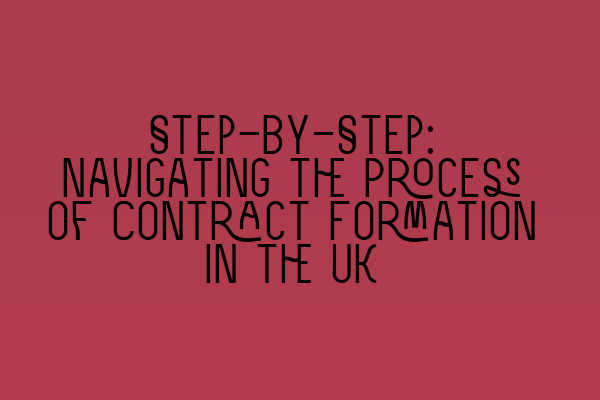Step-by-Step: Navigating the Process of Contract Formation in the UK
Contracts are essential legal agreements that govern the relationships between parties. Whether you’re a business owner, an individual, or a solicitor, understanding the process of contract formation in the UK is crucial. In this comprehensive guide, we’ll take you through each step of the process, highlighting its significance and providing practical insights. So, let’s dive right in!
1. Pre-contractual Stage: Preparation and Negotiations
The first step in the contract formation process is the pre-contractual stage, where parties express their intention to enter into a legal agreement. During this phase, it’s essential to communicate clearly and negotiate the terms and conditions of the contract. Attention to detail and precision in the language used will help avoid misunderstandings and conflicts in the future.
2. Offer and Acceptance: Meeting of Minds
The second step is the offer and acceptance stage, often referred to as the “meeting of minds.” Here, one party makes an offer, outlining the terms of the contract, and the other party accepts those terms. It’s important to ensure that both the offer and acceptance are clear, unequivocal, and communicated effectively to avoid any ambiguity or disputes later on.
3. Consideration: Exchange of Value
Consideration is a vital component of contract formation. It refers to the exchange of value between the parties involved, typically in the form of money, goods, or services. Both parties must provide something of value for the contract to be enforceable. It’s essential to determine what constitutes valid consideration and ensure it is present in the contract.
4. Intention to Create Legal Relations: Binding Commitment
For a contract to be legally binding, the parties must demonstrate an intention to create legal relations. This means that they intend their agreement to be enforceable by law. When drafting a contract, it’s crucial to ensure that the language used reflects this intention and that all parties involved are aware of the legal implications.
5. Capacity and Consent: Competence to Contract
Capacity and consent are significant factors in contract formation. Parties entering into a contract must have the legal capacity to do so, meaning they are of sound mind and at least 18 years old. Additionally, consent must be freely given, without undue influence or duress. To safeguard against future challenges, it’s important to ensure that all parties have the necessary capacity and consent.
6. Compliance with Formalities: Putting It in Writing
While not all contracts need to be in writing, some types, such as those involving land or a guarantee, require certain formalities to be met. It’s essential to understand the specific requirements for the type of contract you’re entering into. Consulting with a solicitor can guide you in complying with these formalities and ensuring a valid and enforceable contract.
7. Legal Validity and Enforceability: Crossing the Ts and Dotting the Is
To ensure the legal validity and enforceability of the contract, attention must be given to its overall structure and contents. Language used should be clear and unambiguous, avoiding any vague or uncertain terms. Clauses relating to breach, termination, and dispute resolution should be carefully drafted to protect the interests of all parties involved.
Conclusion
Understanding the step-by-step process of contract formation is vital for all parties involved in legal agreements. By following these guidelines, you can navigate the process with confidence and create contracts that are legally binding and enforceable. It’s important to seek advice from a qualified solicitor when drafting contracts to ensure compliance with the law and protection of your interests.
For additional insights into legal practice, decision-making, and real-life case studies, check out our related article: Unveiling Real-Life Case Studies: Insights into Legal Practice and Decision-Making.
If you’re interested in exploring solicitor salaries in the UK and the factors affecting income, our article on this topic provides valuable information: Exploring Solicitor Salaries in the UK: Average Earnings and Factors Affecting Income.
Mastering client relationship management skills is paramount for solicitors. Enhance trust and loyalty with our article: Mastering Client Relationship Management: Skills for Solicitors to Enhance Trust and Loyalty.
Considering a law school education in the UK? Choosing the right path is crucial. Find valuable guidance in our article: Pursuing a Law School Education in the UK: Choosing the Right Path for Your Future.
Finally, if you’re looking to secure training contracts on your journey to becoming a solicitor, our article provides a roadmap: Securing Training Contracts: A Roadmap to Becoming a Solicitor.
Remember, contract formation is a complex process, and it’s always advisable to seek professional advice to ensure compliance with the law and protect your interests.
